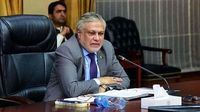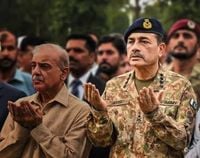In a significant development amidst escalating tensions, Pakistan's Director General of Military Operations (DGMO) has reached out to India's DGMO in an attempt to de-escalate the ongoing conflict. This communication comes following a series of intense retaliatory strikes by India against Pakistan, which have reportedly resulted in substantial losses for the Pakistani military.
The backdrop to this outreach is the recent escalation of hostilities that began with India launching "Operation Sindoor" on May 7, 2025, targeting various militant camps across Pakistan and Pakistan-occupied Kashmir. This operation was a direct response to the April 22 terror attack in Pahalgam that claimed the lives of 26 individuals, primarily tourists, and was attributed to Pakistan-based militants. In retaliation, India has conducted precision strikes on key military installations in Pakistan, including airbases in Lahore, Rawalpindi, and Chakwal.
According to reports, the Pakistani DGMO initiated the call for peace on May 10, 2025, marking the first official military dialogue since the onset of hostilities. This move signals a potential shift in Pakistan's stance, as it seeks to establish direct communication with India to discuss de-escalation and avoid further military confrontation.
Sources indicate that Pakistan's appeal for peace is a response to the severe damage inflicted by India's military actions. The Indian armed forces have maintained a high state of operational readiness, ready to respond to any provocations. Indian military representatives, including Wing Commander Vyomika Singh and Colonel Sofiya Qureshi, stated that all hostile actions from Pakistan have been met with appropriate responses.
On the other hand, Pakistan's Deputy Prime Minister and Foreign Minister Ishaq Dar has also expressed that Pakistan would consider de-escalation, provided India refrains from further retaliatory strikes. This statement underscores the precarious nature of the current situation, where both nations are on high alert, with military movements being closely monitored.
As tensions reached a boiling point, American Foreign Secretary Mark O'Rubio reached out to both Pakistan's army chief and Indian Foreign Minister Dr. S. Jaishankar, urging both sides to engage in dialogue to mitigate the crisis. Rubio emphasized the importance of reducing tensions and finding pathways to communicate effectively to prevent misunderstandings and further escalation.
The Indian government has reiterated its commitment to non-escalation, provided that Pakistan reciprocates this stance. However, the Indian military remains prepared to counter any further aggression from Pakistan, which has been accused of attempting to infiltrate Indian airspace through eight airbases.
Both countries have established mechanisms for communication between their DGMOs, which play a crucial role in managing military operations and addressing immediate concerns. These senior military officers are uniquely positioned to facilitate dialogue to prevent escalation, clarify intentions, and address operational misunderstandings.
The recent military exchanges have highlighted the fragile nature of peace in the region. As Pakistan reaches out for dialogue, the Indian military's response is crucial in determining whether tensions will ease or escalate further. The situation remains fluid, and the coming days will be critical in shaping the future of India-Pakistan relations.
In summary, the outreach from Pakistan's DGMO to India's DGMO represents a significant moment in the ongoing conflict, with both sides recognizing the need for dialogue amidst the backdrop of military actions and retaliatory strikes. As the world watches closely, the hope for de-escalation and peace hangs in the balance.





